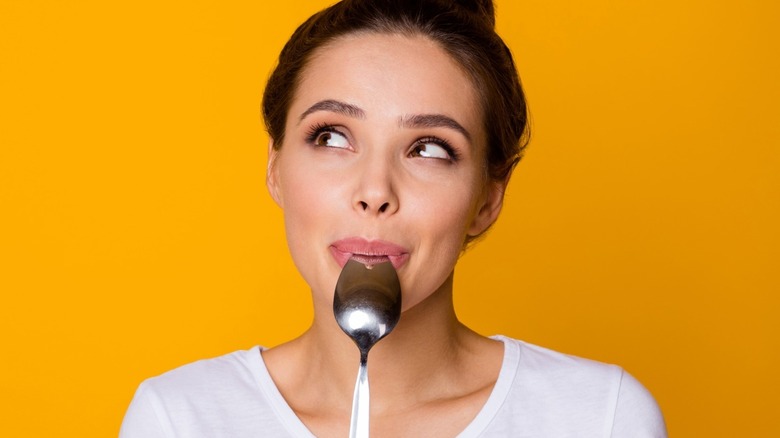What A Recent Study Reveals About Food Language And Taste
Humans have evolved to have a very unique relationship with food. According to Science Alert, the ability to cook our meals changed the way we approached eating and helped humans get better amounts of nutrition. Once modern farmers developed agricultural techniques, society could focus on developing new ways to cook and use ingredients. Fast forward to the present, and you have a ton of food preferences at your disposal. However, The Cut reports that while you may have the ability to choose between a ton of food, your true preferences are more or less hardwired into your biology.
Experts have postulated that humans' preference for certain types of food starts before birth. What a parent eats while pregnant, for example, can translate to an infant's initial food preferences. Positive association also plays a major role in the development of taste preference. If a person learns to associate certain tastes with a positive or negative bodily effect, their physiology responds in kind and can unconsciously create a biological preference for specific foods. On the other hand, certain foods like sugar trigger a hardwired response from our bodies, as they come loaded with essential nutrients like carbohydrates that our biology craves. While many biological factors influence taste preferences, a new study reveals how the psychology behind language also affects our eating habits.
Putting a spin on our favorite foods
According to Ohio State News, a recent study revealed that the word associations around popular food affected the way people felt those foods tasted. In the study, participants ranked the taste of Saltines and chocolate chip cookies on a spectrum ranging from "dislike extremely" to "like extremely." Each food sample came with a specific label: "new and improved," "factory typical," or "consumer complaint." The study, which examined the effect of positive and negative bias on food perception, uncovered some very profound results. Scientists found that the foods labeled as "new and improved" scored better when it came to taste, but the items labeled as "consumer complaint" scored even worse than expected.
The study's results illustrated a clear link between negative labeling and the perception of taste, despite the fact that all the cookies and crackers used in the study were the same. This could mean that companies that focus on negative elements of food may see a greater response from buyers. "If people are more sensitive to those taints, we can use it to our advantage as it relates to food," Christopher Simons, one of the study's authors, said. "You get a bigger bang for your buck by removing things people find negative than you do by optimizing those positive attributes. Take care of the negatives first and you're probably going to have a more successful product."

